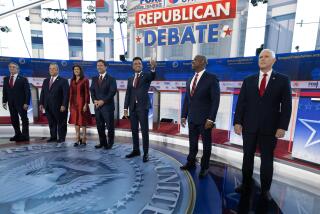Reagan Appeals to Public in Battle to Help Contras
- Share via
SANTA BARBARA — Comparing U.S. support for Nicaraguan rebels with French backing for the American Revolution, President Reagan on Saturday appealed for the public’s help in his battle to press Congress to resume covert funding for what he called anti-Sandinista “freedom fighters.”
The President, broadcasting from his ranch, chose his weekly radio address to begin a personal, extensive lobbying campaign to obtain $14 million in covert aid for the rebels, known as contras.
A White House official, who spoke later with reporters on condition that he not be identified, acknowledged that “the real nail in the coffin last year,” prompting a bitter Congress to cut off covert aid to the rebels, was the controversial CIA-directed mining of a Nicaraguan harbor.
In his radio broadcast, Reagan argued that it has been America’s tradition, after having won its own independence with the help of France and individual Europeans, to assist other freedom fighters throughout the world in breaking the chains of oppression.
“And now the free people of El Salvador, Honduras and, yes, of Nicaragua ask for our help,” Reagan said. “There are over 15,000 freedom fighters struggling for liberty and democracy in Nicaragua and helping to stem subversion in El Salvador.
“They’re fighting for an end to tyranny and its only reliable product--cruelty. They are our brothers. How can we ignore them? How can we refuse them assistance when we know that ultimately their fight is our fight?
“We must remember that if the Sandinistas are not stopped now, they will, as they have sworn, attempt to spread communism to El Salvador, Costa Rica, Honduras and elsewhere.”
Reagan denounced Nicaragua’s Sandinista regime as “a Marxist-Leninist clique that broke the hearts of the freedom-loving people of their country by imposing a brutal dictatorship soon after taking control in 1979.”
“Functioning as a satellite of the Soviet Union and Cuba,” he continued, “now they’re exporting drugs to poison our youth and linking up with the terrorists of Iran, Libya, the Red Brigades and the PLO.”
Reagan seemed to be strongly implying that his Administration supports the rebels’ goal of overthrowing the Managua government by force. But the anonymous White House official told reporters that “we’re stopping short of saying we’re advocating the overthrow.”
Official Explains Goals
“What we’re trying to do,” the official said, “is to prevent the final consolidation of the Sandinistas as a totally Marxist-Leninist society. We believe that represents a long-term threat to political stability in Central America--in fact, in all of the Americas.
“Our second objective,” the official continued, “would be to ensure that Nicaragua establishes a pluralistic and fully democratic government. We believe this can be done without the use of U.S. military forces . . . . There’s nothing in anybody’s mind about U.S. military intervention down there.”
Reagan referred only in passing to his Administration’s latest public argument, outlined Friday by a State Department official, that military pressure on the Sandinistas is needed to force the leftist government to negotiate with the rebels, based in Honduras and Costa Rica.
“The freedom fighters are putting pressure on the Sandinistas to change their ways and live, not as communist puppets, but as peaceful democrats,” the President told his listeners. “We must help. Congress must understand that the American people support the struggle for democracy in Central America.”
‘A Critical Year’
The aide who talked with reporters said “everybody recognizes that this is a critical year” in the fight to change Nicaragua’s form of government before Marxism becomes solidly entrenched.
“It’s going to be a fight” to resume the funding, he conceded. “We’re going to do an educational program . . . sort of a President-to-the-people campaign in order to mobilize some support.”
It was Reagan’s idea to argue that helping “freedom fighters” is in America’s centuries-old tradition, the White House official said.
“In the 19th Century, we supported Simon Bolivar, the great liberator (of South America),” the President said. “We supported the Polish patriots, the French Resistance and others seeking freedom (in World War II) . . . . It’s not an American tradition to turn away. And lucky for us that those who loved democracy 200 years ago didn’t turn away from us.”
Reagan noted that the Marquis de Lafayette of France, Baron Friedrich Wilhelm von Steuben of Prussia and Thaddeus Kosciusko of Poland all served in the Continental Army and were American Revolutionary War heroes.
“This is not a story from some romantic past,” the President said. “This is how democracy was built--with one country, one people helping another in their hour of greatest peril.”
More to Read
Sign up for Essential California
The most important California stories and recommendations in your inbox every morning.
You may occasionally receive promotional content from the Los Angeles Times.














